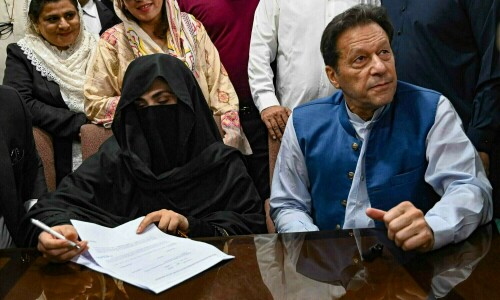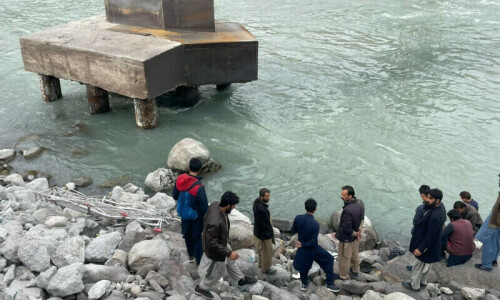WASHINGTON, June 22: The United States is using a combination of incentives and sanctions to prevent the construction of the proposed Iran-Pakistan-India (IPI) gas pipeline.
Earlier this week, a US Senate panel approved legislation to tighten sanctions on Iran, a move which will further complicate the efforts to build the IPI pipeline.
Recently, the United States also facilitated an agreement between Afghanistan and three of its neighbouring countries to build a $7.6-billion pipeline that would deliver natural gas from Turkmenistan to energy-starved Pakistan and India, a project running right through the volatile Kandahar province.
An official Canadian report released this week, quotes an energy economist John Foster as saying that the Turkmenistan-Afghanistan-Pakistan-India (Tapi) pipeline is part of a wider effort by the United States to counter the influence of Russia and Iran over energy trade in the region. To prepare for proposed construction in 2010 of the Tapi pipeline, the Afghan government has given assurances it will clear the route of landmines, and make the path free of Taliban influence.
But both in India and Pakistan, the IPI pipeline is seen as a better alternative because unlike Afghanistan, Iran is stable and can provide security guarantees Kabul cannot.
India, as the world’s sixth-largest energy consumer, also favours the deal with Iran because it has had traditionally good relations with this top energy exporter. Pakistan, meanwhile, is eager to sign onto the plan because it would mean roughly $1 billion in profits from transit fees for Islamabad.
The IPI is, however, opposed by the United States because of the Iranian involvement.
Earlier this week, the US Senate Finance Committee cleared a bill to expand trade and financial sanctions on Iran. The measure would strengthen existing US sanctions by tightening the trade ban on goods to and from Iran. The bill also would expand financial sanctions on some Iranian individuals, and penalise US companies if their foreign subsidiaries do business with Iran.
A 1996 law known as ILSA already forbids international investment in Iranian oil and gas projects. It requires the US president to impose sanctions on any international firm that does $40 million or more in oil or gas business with Iran. The new law would prevent US companies from doing business with international firms that invest in Iranian oil and gas projects and will make it difficult for India, Iran and Pakistan to seek investment or technical support for the IPI pipeline.
During the weekend, the official Voice of America radio broadcast a special programme on the project, noting that land-based pipeline will deliver natural gas to markets in India and Pakistan from the South Pars gas fields in Iran. The programme also noted that despite economic benefits for India and Pakistan, the United States opposes the project because it believes that it would diminish Washington’s influence over the Islamic Republic.
While talking to VOA, Indian Foreign Secretary Shiv Shankar Menon assured Washington that neither the pipeline nor the relationship between India and Iran should concern Washington or any other third country. “Everything we do with Iran is open, above board and quite clear to everybody. Frankly, from our point of view, the more engagement there is, the more Iran becomes a factor of stability in the region, the better it is for us all,” he said.
Meanwhile, the Indian government is also facing pressure from its communist partners of the ruling coalition to conclude the IPI gas pipeline deal. The Communist Party of India-Marxist claims that the Indian government is delaying the deal to please Washington.
In a recent statement, the party urged the Indian government to use External Affairs Minister Pranab Mukherjee’s visit to Tehran next month to clinch the agreement for negating this perception.
“It is absolutely imperative that Mr Mukherjee during his visit to Tehran must take up this issue.”













































Dear visitor, the comments section is undergoing an overhaul and will return soon.